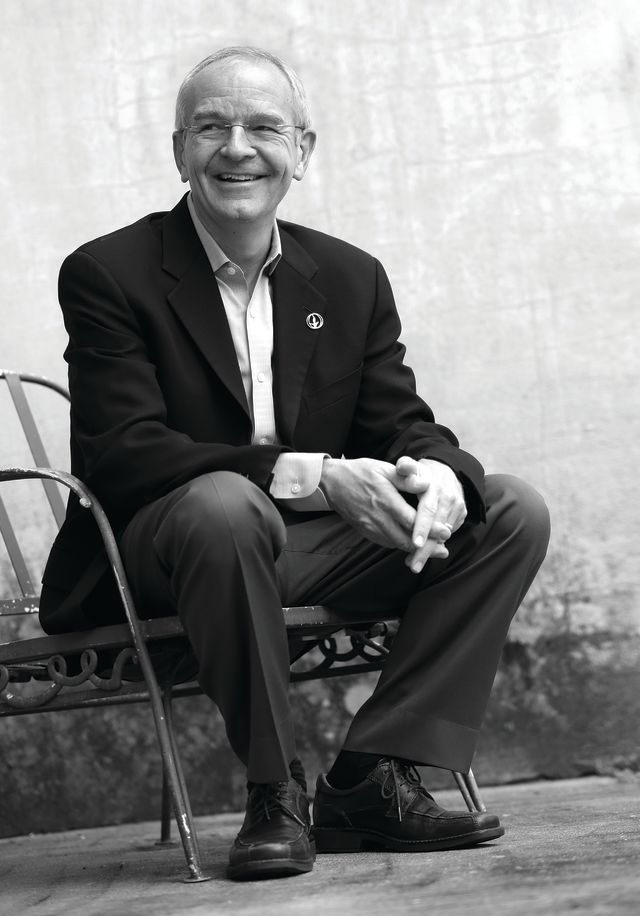Brock Leach, Retired CEO of Frito-Lay North America and Tropicana, On What He's Learned in Business

Image: SALVATORE BRANCIFORT
What comes after Gatorade and Fritos? For Brock Leach, the retired CEO of Frito-Lay North America and Tropicana—a PepsiCo company—the answer is ministry. After launching some of the country’s most successful consumer products, Leach retired a decade ago from Tropicana and headed to divinity school to become a Unitarian Universalist minister. You won’t find him behind a pulpit on Sundays, though; his congregation is the world. As the Unitarian Universalist Service Committee’s executive consultant for mission, strategy and innovation, Leach uses his business acumen for social justice causes. He also recently launched a multi-faith initiative to organize people who are not affiliated with a religion to lead lives of integrity and purpose.
“I am trying to create opportunities for people who are spiritual but not religious. It’s a start-up community for religious entrepreneurs. In many ways it’s the same kind of work I did at Frito and PepsiCo: running innovation and being a general manager. I work to empower grassroots organizations whose rights are denied. The program takes people of all ages into the heart of justice issues. We work with communities to assert their own rights so they bring about the change. For example, after the hurricane in Haiti, there was a huge in-pouring of financial aid that was not accounted for. Our approach was to work with rural Haitians. They took it upon themselves to rebuild their own villages; we provided money and technical assistance. It was far better than building a sweatshop factory.”
“Your true calling is the intersection of what you love to do and what you are good at, which is not always the same thing. In my business career I saw people who were good at what they did but they didn’t enjoy their work. They chose a career to please their parents or to make money. Life is too short.”
“Embrace reality. I mean that positively and negatively. When you walk into an organization, it’s got assets and negatives. You have to confront both and it’s hard to do. You want to gloss over the negatives. Companies that fail, fail because they stick their head in the sand over some inconvenient truth.”
“Don’t get enamored with something that looks revolutionary. Proctor & Gamble invented Olestra (a food oil that adds no fat or calories) and received Food and Drug Administration approval to use it in snack foods in the 1990s. I was working at Frito-Lay at the time and we partnered with P&G, our biggest competitor, to bring WOW baked potato chips to market. Olestra looked like a miraculous product because people couldn’t taste it. In the run-up to getting Olestra to market, it came out that if you ate a huge amount of Olestra, it caused gastrointestinal issues but most people had no problem digesting it. The FDA made us put a warning label on the snacks. It was a public relations nightmare. But at the point of going to market we were committed to the product and nobody wanted to back off. We weren’t paying enough attention to what was happening around us.”
“When I went to business school, I thought I’d do nonprofit work. When I was 15 and living in a tiny rural Colorado town, I spent a summer working for a minister who believed the church was out in the world. He took us to work with migrant farmers and to alcohol rehabilitation centers. I wanted to be like him. But he discouraged me; he told me the ministry happens in different places and I could do ministry later. I was insulted but I more or less took his advice. In the back of my head I always thought when this corporate thing doesn’t work out, I’ll do ministry.”
“I never aspired to be CEO. I took on work that other people thought would not lead to success in the company. PepsiCo had a lean corporate structure; you could try new things if you had a reasonable idea. I bounced around and had all these experiences. When they needed someone to see the big picture, I had been around the horn. It was dumb luck.”
“I’m an organizational guy now into wonky religion stuff. As part of training I had to do clinical work at Tampa General as a trauma chaplain. I was terrified; I had no experience. But it turned out to be the experience of a lifetime. I have stories of incredible people in tragic situations. They find resilience they didn’t know they have. What matters most are the people in your lives and relationships. When I’m done with the organizational stuff, I’ll go back to that.”



